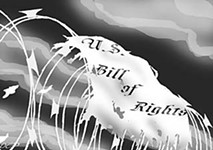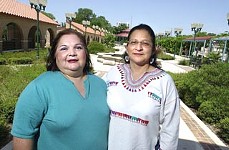La Raza: Waking the Sleeping Giant?
The National Council of La Raza looks to raise the U.S. Latino profile.
By Lauri Apple, Fri., July 18, 2003

Along the carpeted aisles of the Latino Expo USA -- the midway attraction of the 35th annual National Council of La Raza convention, held at the Austin Convention Center last weekend -- a skeptical question seemed to hang in the air: Is this a political conference or a carnival underwritten by corporations to distract el pueblo from the issues?
There were the musical performances televised in full color at landfill giant Waste Management Inc.'s booth (reflecting, perhaps, a subconscious commentary on the quality of the music?). There was the baritone on the intercom, reminding conventioneers to stay tuned for more Nordstrom gift giveaways. There were the multicolored Slinkys emblazoned with "Department of Energy" -- currently a corporate subsidiary, thanks to the Bush administration's intimate ties to oil, gas, mining, and nuclear-energy interests.
A gigantic inflatable Marine towered over the crowd. ConAgra Foods was on hand with free popcorn; Goya, chips and salsa; Quaker Oats, fruity breakfast bars; and Country Cousins, sizzling hamburgers.
The expo -- "the big selling event," as one local NCLR member mockingly called it -- was not the focus of the conference, otherwise a four-day blitz of symposia, speeches by high-profile politicians, workshops, and networking opportunities, most of which took place much more quietly. Yet considering NAFTA's maquiladoras, the U.S. border job-drain, the desperate poverty in regions like the Valley, and even the effects of fast food on barrio cholesterol levels -- acknowledged backhandedly by a kickoff run called the "Diabetes Dash" -- all of the corporate festivities seemed more than a little contradictory.
But judging from the flocks of conventioneers carrying McTote bags full of goodies, the eager corporate presence was an undeniable sign of progress -- and evidence that Grande Business, though perhaps not yet fully bilingual, is welcoming Latino customers into the fold. "Corporate America is paying attention," Hector Flores, national director of the League of United Latin American Citizens, proudly declared. Companies would be foolish not to: Hispanics now constitute the U.S.'s largest minority, at 38.8 million (and 40% foreign-born).
"Corporate sponsors do not drive our policies," emphasized Marcela Urrutia, a staffer from NCLR's Washington, D.C., headquarters. "We don't do something because Wal-Mart says to." Regardless of which corporation provides how much convention sponsorship cash, she says, NCLR remains committed to the mission it has promoted since its founding in 1968: to reduce poverty and discrimination and improve the overall lot of Hispanic Americans. With more than 300 affiliate organizations representing more than 4 million Hispanics in 37 states, the District of Columbia, and Puerto Rico, NCLR has become over time the largest constituency-based Hispanic organization in the country. Aside from campaigns tackling welfare reform, homeland security measures that unfairly target immigrants, and other problems, the group also releases policy papers; runs its own programs in leadership development, community education, homeownership, and diabetes prevention; and promotes legislation geared toward closing inequities and "opportunity gaps" (for example, the federal "Student Bill of Rights Act," intended to improve education for low-income schoolchildren).
NCLR hopes soon to increase its presence in Texas, home to more than 6.5 million Hispanics (32% of the state population and growing rapidly). Urrutia, who spent the past three legislative sessions as a lobbyist, says the relationship between NCLR and its sister organizations in Texas have reached a new level of collaboration but that the dismal outcome of this year's session demands even more grassroots organizing. NCLR will soon add an office in Austin to the one in San Antonio and its network of affiliates statewide.
NCLR also hopes to influence national elections, and the conference headliners included Democratic presidential hopefuls Howard Dean of Vermont and Sen. John Kerry of Massachusetts (backed by former U.S. HUD Secretary/San Antonio Mayor Henry Cisneros); House Minority Leader Nancy Pelosi, D-Calif.; New Mexico's Democratic Gov. Bill Richardson; and Sen. Kay Bailey Hutchison.
NCLR leaders are clearly leaning Democratic in 2004. "As we gather here, the Bush administration is analyzing the Hispanic vote, studying political maps, and plotting their Latino strategy," NCLR CEO and President Raul Yzaguirre told his audien as many pictures with us as possible."
Texas members are eager to help NCLR affect policy on both a national and state level, says state Rep. Rene Oliveira, D-Brownsville, who serves on NCLR's national board. A backlash will eventually emerge against the right-wing Republicans leading Texas and the nation, Oliveira says, and who better to help lead the way than the state's growing Hispanic population? For now, minorities and "apathetic" Texans remain "the sleeping giant," he concluded, and the NCLR plans to become a catalyst for the awakening.
Got something to say on the subject? Send a letter to the editor.








